Nasu Dengaku, or Miso Glazed Eggplant, is a traditional Japanese dish that showcases the rich umami flavors of miso combined with the silky, tender texture of roasted eggplant. This dish is not only visually stunning with its glossy miso glaze but also incredibly delicious, making it a standout option for both casual home meals and impressive dinner parties. The balance of savory and sweet notes in the glaze complements the natural earthiness of the eggplant, creating an irresistible side or main dish that delights both vegetarians and meat-lovers alike.
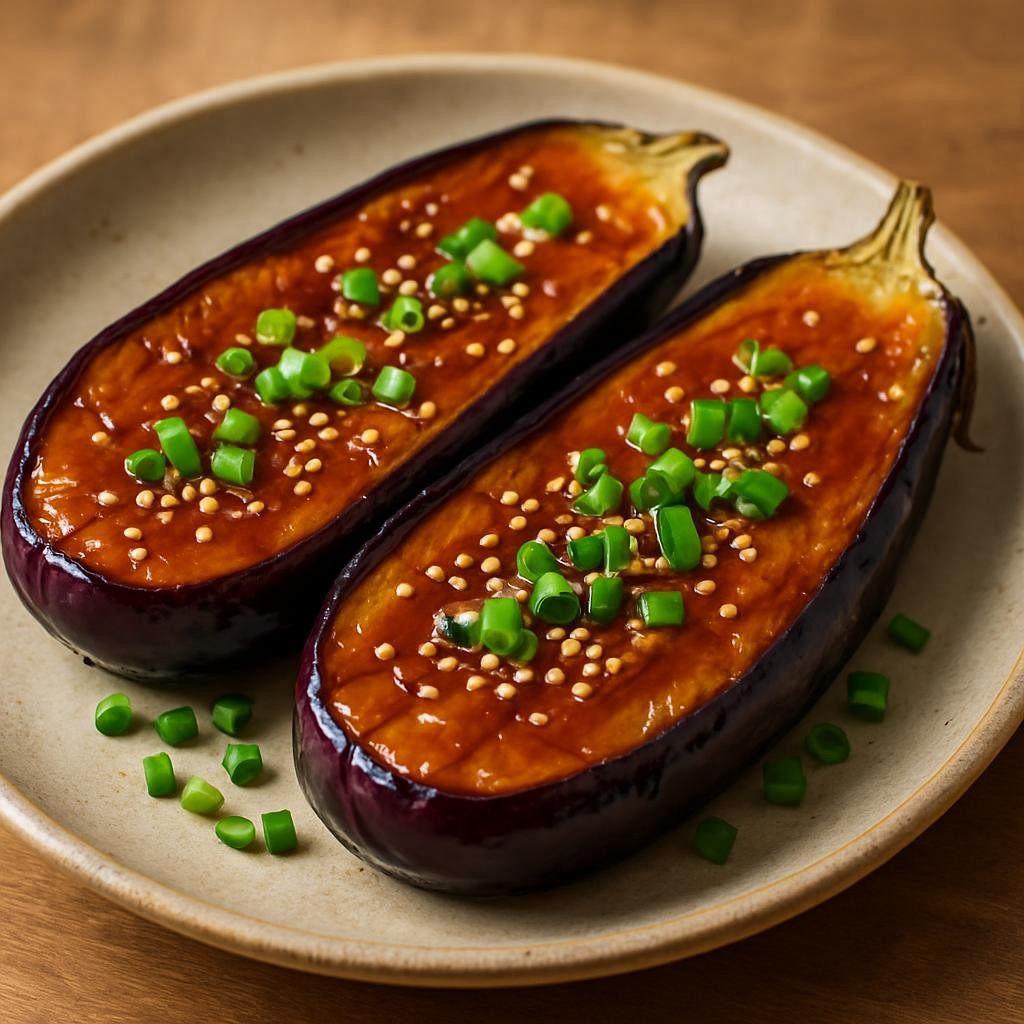
Why You Will Love This Recipe
You will absolutely love Nasu Dengaku for its incredible flavor profile and ease of preparation. The combination of sweet and savory miso glaze perfectly enhances the eggplant without overwhelming its natural taste. This dish is also very adaptable, fitting well into vegetarian, vegan, and gluten-free diets, making it perfect for gatherings where dietary needs vary. Plus, the roasting process allows for minimal hands-on time, letting you enjoy the delightful aroma wafting through your kitchen while you prepare other components of your meal.
Tips and Tricks
- Choose Japanese eggplants for a sweeter, less bitter taste, but if unavailable, globe eggplants will work just as well.
- For added depth of flavor, consider adding a splash of rice vinegar or a sprinkle of sesame seeds to the miso glaze.
- If you’re short on time, you can microwave the eggplants for a few minutes before roasting to speed up the cooking process.
- Broil the eggplants in the last few minutes of cooking to get a beautifully caramelized glaze without overcooking the eggplant.
Make Ahead Tips
You can prepare the miso glaze a day in advance and store it in the refrigerator. The flavors will meld beautifully overnight, enhancing the dish even further. You can also slice the eggplants ahead of time; just sprinkle them with a little salt and let them drain in a colander to remove excess moisture. Store them in an airtight container in the fridge for up to 24 hours before roasting.
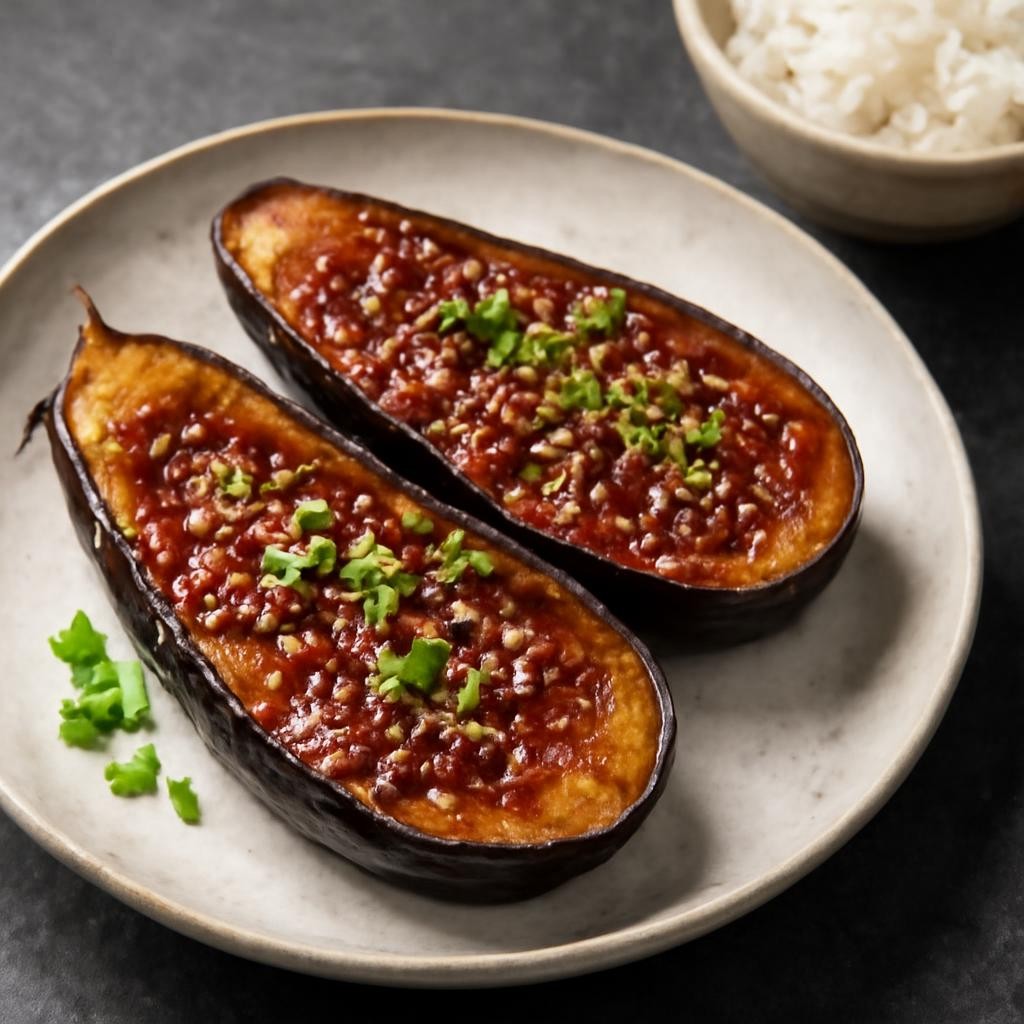
Recipe Variations
- For a spicy kick, add a teaspoon of chili paste or Sriracha to the miso glaze.
- Consider topping with fresh herbs such as cilantro or green onions for added freshness.
- If you prefer grilling, try grilling the eggplants instead of roasting them for a smoky flavor.
- For a twist, incorporate other vegetables like zucchini or bell peppers coated in the same miso glaze.
How to Serve
Serve Nasu Dengaku hot off the grill or out of the oven, garnished with a sprinkle of sesame seeds and chopped scallions for a pop of color. Pair it with steamed rice or quinoa to soak up the delicious glaze. For a more complete meal, serve it alongside a light salad or pickled vegetables to balance the richness of the dish.
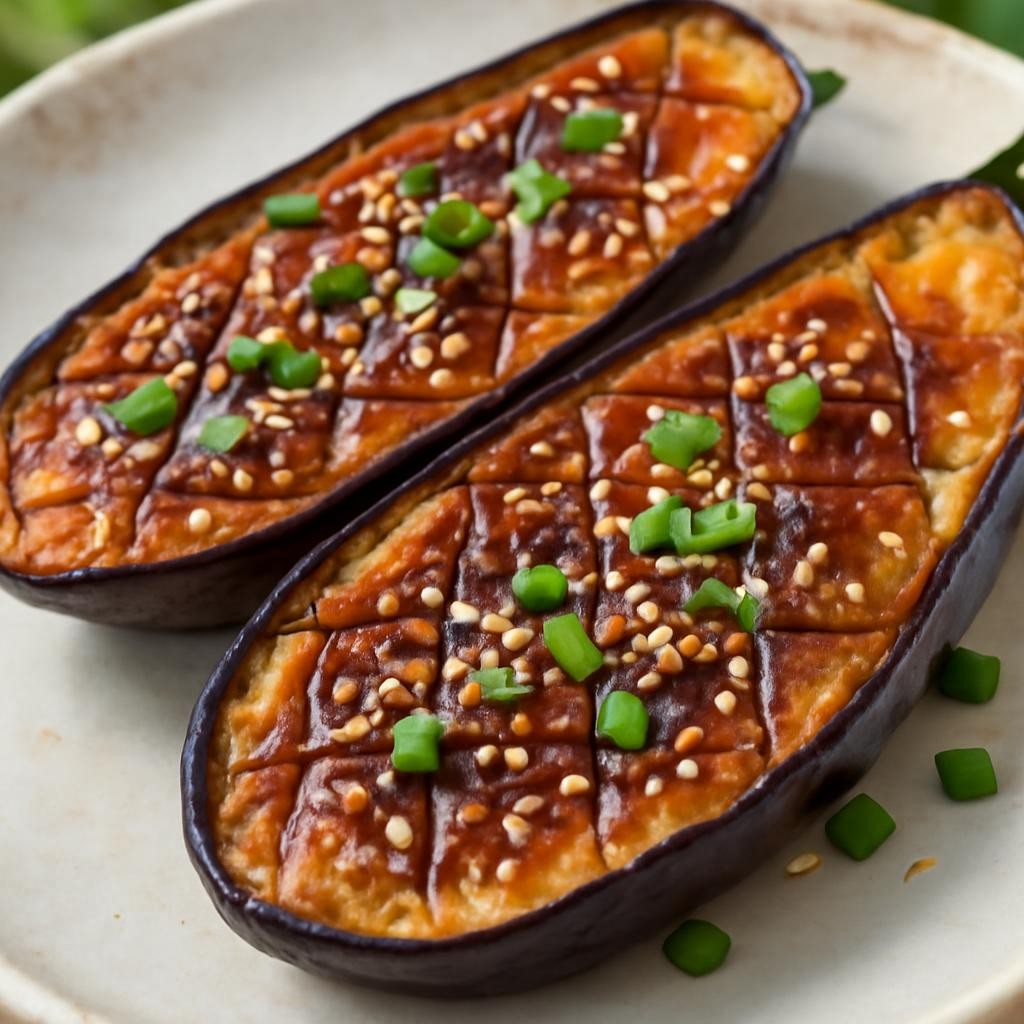
Pairing Suggestions
A chilled glass of sake or a light, fruity white wine like Sauvignon Blanc will complement the flavors beautifully. For non-alcoholic options, consider serving it with green tea or a refreshing cucumber lemonade. When it comes to side dishes, a simple miso soup or a crunchy seaweed salad would pair wonderfully with this dish.
How to Store
Leftover Nasu Dengaku can be stored in an airtight container in the refrigerator for up to 3 days. To freeze, place the cooked eggplant in a freezer-safe container, where it can last for up to 2 months. When reheating, it’s best to do so in the oven or toaster oven to maintain the texture; simply warm at 350°F until heated through.
Equipment Needed
- A baking sheet or roasting pan
- Parchment paper (optional, for easy cleanup)
- A mixing bowl for the miso glaze
- A sharp knife and cutting board for slicing the eggplant
- A whisk for blending the glaze ingredients
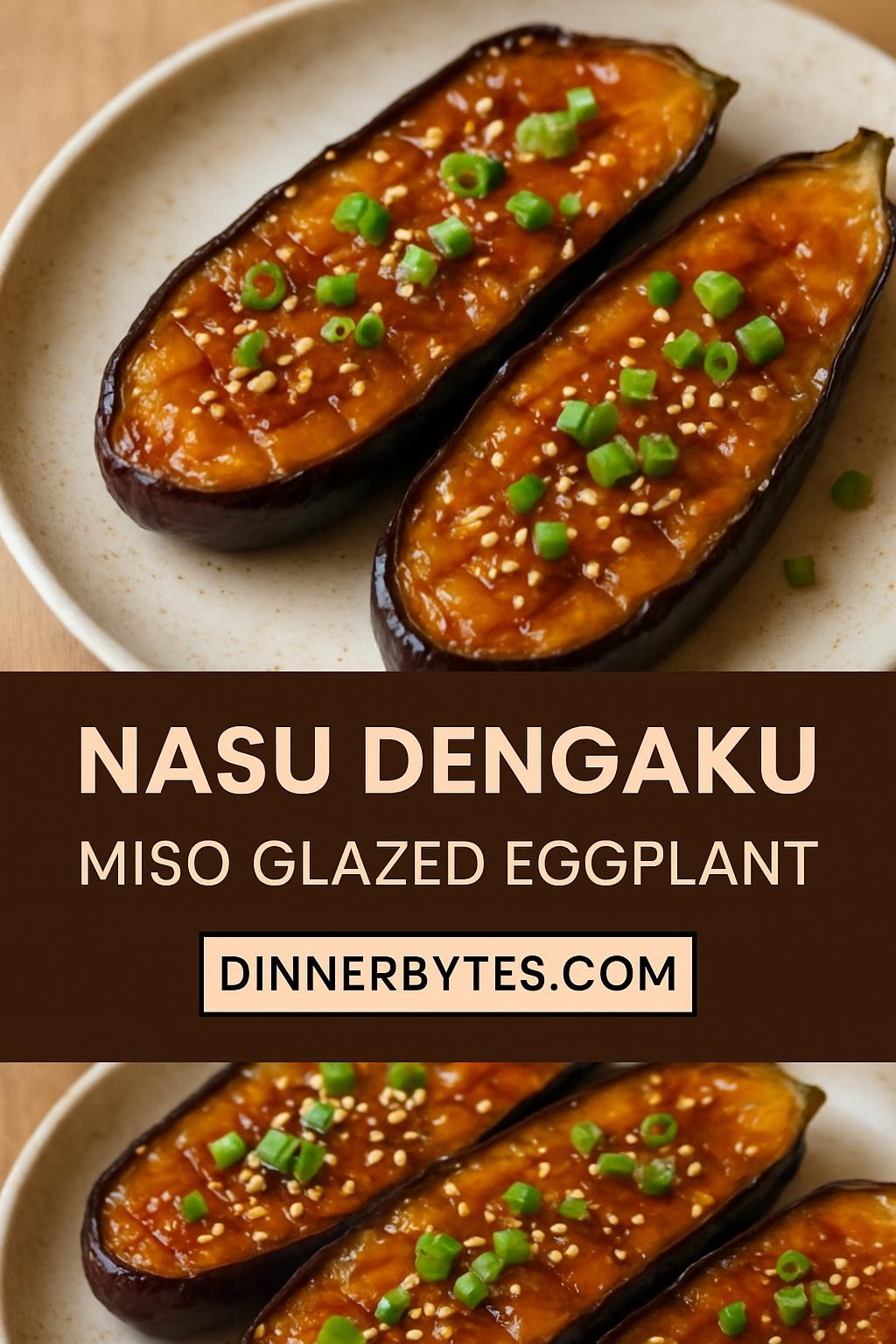
Dietary Adaptations
To make Nasu Dengaku vegan, ensure you’re using a miso paste that is free from any animal products. For a gluten-free version, opt for gluten-free miso and soy sauce. Additionally, if you’re nut-free, double-check that your miso paste does not contain any allergens. You can also substitute honey with agave syrup for a fully plant-based sweetener.
Seasonal Adaptations
In the summer, fresh garden eggplants are at their peak, providing the best flavor and texture. In the fall, consider adding roasted pumpkin or butternut squash to the dish for a heartier addition. In winter, you can use a variety of root vegetables alongside eggplant for a warming and comforting dish.
Recipe FAQs
- Can I substitute the miso paste? Yes, you can use tahini or a nut butter for a different flavor profile, although it won’t replicate the exact taste of miso.
- How long does it take to cook? The eggplants typically take about 25-30 minutes to roast, depending on their size and thickness.
- Can I make this dish in advance? Yes, you can prepare the miso glaze ahead of time and store it in the fridge for up to a week.
- What can I use instead of miso? While miso has a unique flavor, you can try using tahini or a combination of soy sauce and nut butter as an alternative.
How To Make Nasu Dengaku – Miso Glazed Eggplant
Nasu Dengaku - Miso Glazed Eggplant
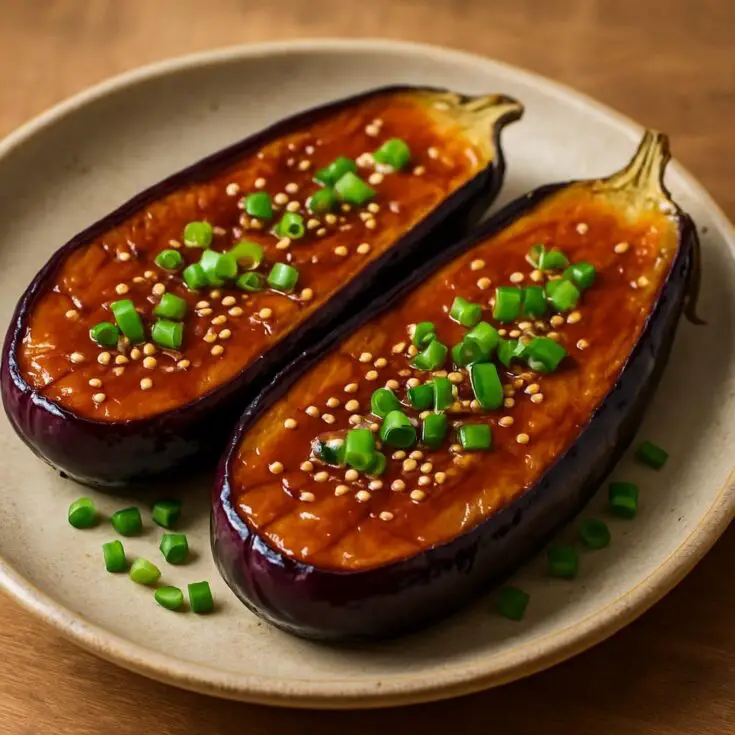
Ingredients
- 2 medium Japanese eggplants (or 1 large globe eggplant)
- 3 tablespoons miso paste (white or red)
- 1 tablespoon mirin (sweet rice wine)
- 1 tablespoon sugar (or agave syrup for vegan option)
- 1 teaspoon soy sauce (or tamari for gluten-free)
- 1 teaspoon sesame oil
- 1 tablespoon water (to thin the glaze)
- Sesame seeds and chopped green onions for garnish
Instructions
- Preheat your oven to 400°F (200°C).
- Slice the eggplants in half lengthwise, scoring the flesh in a crosshatch pattern without cutting through the skin.
- Place the eggplant halves cut side up on a baking sheet lined with parchment paper.
- In a mixing bowl, whisk together the miso paste, mirin, sugar, soy sauce, sesame oil, and water until smooth.
- Brush a generous layer of the miso glaze over the cut side of the eggplant.
- Roast in the preheated oven for about 25-30 minutes, or until the eggplant is tender and the glaze is caramelized.
- For an extra caramelized finish, switch to broil for the last 3-5 minutes, keeping a close eye to prevent burning.
- Remove from the oven and garnish with sesame seeds and chopped green onions before serving.
Nutrition Information
Yield
4Serving Size
1Amount Per Serving Calories 198Total Fat 6gSaturated Fat 1gTrans Fat 0gUnsaturated Fat 5gCholesterol 0mgSodium 555mgCarbohydrates 35gFiber 9gSugar 15gProtein 5g
dinnerbytes.com, occasionally offers nutritional information for recipes contained on this site. This information is provided as a courtesy and is an estimate only. This information comes from online calculators. Although dinnerbytes.com attempts to provide accurate nutritional information, these figures are only estimates.
Final Thoughts
Nasu Dengaku is a delightful dish that transcends the ordinary, offering a perfect balance of flavors and textures. It’s simple enough to whip up on a weeknight yet impressive enough for special occasions. With its versatility and adaptability, you can enjoy this delightful miso glazed eggplant in countless variations. Give this recipe a try, and let the rich flavors transport you to the heart of Japanese cuisine!







